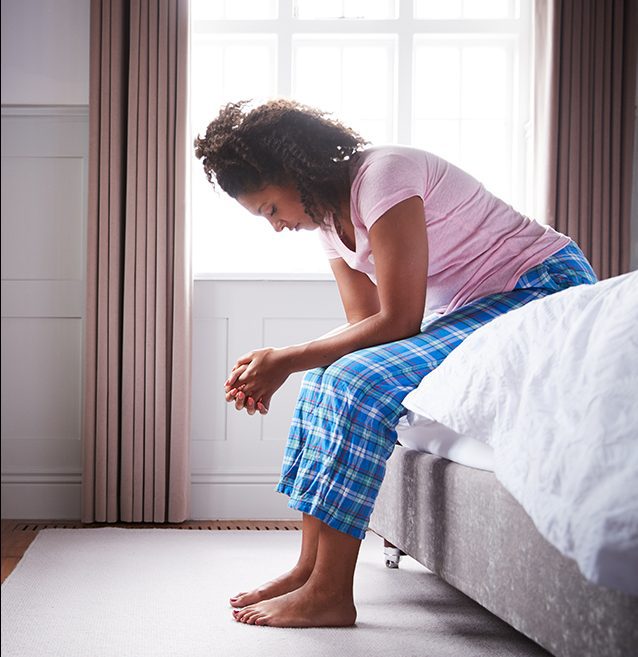Jump straight to the information you need
Epilepsy Action has more information about seizures that happen during sleep.
Epilepsy and fatigue
The links between sleep and epilepsy are complex. Seizures in your sleep, or when you are awake, can have a big effect on your body afterwards and cause you to feel extremely tired. For some people, lack of sleep can also be a seizure trigger, which can lead to a negative cycle.
Fatigue is a feeling of overwhelming tiredness, weakness or exhaustion that can be mental, physical or both. When you have epilepsy, you are more likely to be affected by fatigue than other people.
Having disrupted sleep, because of seizures or the effect of epilepsy medicines, makes fatigue more likely. You are also at more risk of having fatigue if you are depressed.
Epilepsy Action has more information about having seizures in your sleep if you think this could be a cause of your fatigue.
Side effects of epilepsy treatments on sleep
Studies suggest that certain epilepsy treatments may help sleep, while others could make it worse. So it’s important to talk to your doctor if you have sleep problems.
Most people with epilepsy take epilepsy medicines to control their seizures and these can have side effects. These might include difficulty getting to sleep, difficulty staying asleep, or might cause you to be very tired during the day.
If you think your epilepsy medicine is causing side effects, talk to your doctor or epilepsy nurse as they may be able to help. They may be able to suggest a different medicine with fewer side effects related to sleep. Or they may be able to suggest a different routine for taking your medicine so it has less impact on your sleeping pattern.
It’s important to always speak to your healthcare team before making any changes to your epilepsy medicines.
Sleep disorders
People with epilepsy have a higher chance of also having a ‘sleep disorder’ than people who don’t have epilepsy. Sleep disorders or disturbances can affect your seizure patterns because broken sleep and tiredness trigger seizures for some people. Sometimes it’s hard to tell if your disturbed sleep is related to your epilepsy, or because you also have a separate sleep disorder.
There’s more information about these sleep disorders on the NHS website:
- Sleep apnoea
- Restless legs syndrome
- Insomnia
- Teeth grinding
- Excessive daytime sleepiness (hypersomnia)
Sleep problems can have a big impact on your life. If there’s a possibility that you have a sleep disorder, your doctor might be able to advise you on how to improve your sleep and might refer you for a sleep study. Sleep studies can take different forms and can help to show exactly what problems you’re having while you’re asleep.
Treating sleep problems
Your doctor or epilepsy specialist can help try to find the cause of your sleep problems and if needed, suggest possible changes to your epilepsy treatment.
If you also have a sleep disorder, there may be other treatments that your specialist may recommend, such as:
- Therapies such as cognitive behavioural therapy (CBT)
- If you have sleep apnoea, a CPAP machine to gently pump air into a mask you wear over your mouth or nose while you sleep
Managing tiredness and fatigue
The NHS website has some general advice to help everyone with tiredness and fatigue:
Eat regularly
Eating smaller regular meals, with healthy snacks in between can help to keep your energy levels up.
Get active
Regular physical activity can help you feel less tired over time. If you’re not used to exercising, start with small amounts of gentle exercise and build up slowly. Even a 15-minute walk can give you an energy boost.
Lose weight
If you’re overweight, gradually losing weight can help you have much more energy. Being overweight can also put a strain on your heart which can make you more tired.
Reduce stress to boost energy
Stress uses up a lot of energy. Try to do something relaxing every day. You could try yoga, listening to music, reading, or spending time with friends. Whatever relaxes you will improve your energy.
Ask your GP about talking therapies
There’s evidence that talking therapies can help some people with fatigue.
Cut down on caffeine and alcohol
Drinking too many drinks containing caffeine (such as coffee, tea, cola and energy drinks) can make it harder to get a good night’s sleep. It’s usually best to cut down gradually over a few weeks while your body gets used to this. Drinking alcohol before bed can make you sleep less deeply, so you’ll feel more tired in the morning.
Have a good sleep routine
There are some suggestions to help with this:
- Try to follow a relaxing bedtime routine and go to bed and get up at the same time each day
- Take some time to properly relax before going to bed. You could read a book, listen to relaxing music or meditate
- Avoid drinks containing caffeine late in the day
- If things are on your mind, you might find writing them down to deal with tomorrow could help
- Avoid watching TV or using devices before bed
- Create a good environment that is dark, quiet and a comfortable temperature
- Have a comfortable bed with a supportive mattress
- If you can’t sleep, you might find it helpful to get up for a short time. After doing something relaxing, you should feel tired enough to go to bed again
We have more information on complementary treatments that may help with relaxation.
Got any questions?
Our expert advisors can help you with any questions you might have about fatigue or anything else related to living with epilepsy.



